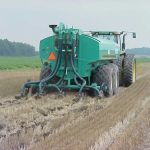The USDA has extended the sign up deadline for the Dairy Margin Protection Program to June 22nd. USDA-MPP Extended Deadline Notice
Dairy farms should seriously consider this program. See our previous post in May with more details.

The USDA has extended the sign up deadline for the Dairy Margin Protection Program to June 22nd. USDA-MPP Extended Deadline Notice
Dairy farms should seriously consider this program. See our previous post in May with more details.
The sign-up period for MPP coverage in 2018 will close on June 1, 2018.
 If you’re shipping milk you should check out how the USDA has revamped the Margin Protection Program (MPP) for 2018. Premiums have dropped, especially for Tier I pricing (less than 5 million lbs of milk). Here’s how it works.
If you’re shipping milk you should check out how the USDA has revamped the Margin Protection Program (MPP) for 2018. Premiums have dropped, especially for Tier I pricing (less than 5 million lbs of milk). Here’s how it works.
The program makes payments when the monthly margin between the U.S. all-milk price and national average feed costs falls below the level of coverage chosen by the producer. Above the basic $5 margin level for the first 5 million pounds there are supplemental coverage options available for purchase in 50-cent increments. Supplemental coverage can extend up to $8/cwt. The program pays on one-twelfth of a producer’s annual production history, multiplied by the percentage of supplemental coverage chosen, from 25% up to 90%, plus the remaining coverage provided on the farm’s production history at the basic $5 level. Once a farm enrolls in the MPP it is committed to the program through 2018. Farmers must have an up-to-date Form 1026, signifying that they meet conservation requirements, in order to participate.
For example, if you use 3,000,000 lbs milk production history and the $8.00 MPP level and elect to insure 90% of that production you could receive an estimated $13,897 in total payments. At a premium cost of $4,196, that’s a net return of $9,701 for the whole year, after premiums are covered. The January, February and March margins are set, and in the above scenario, the payout so far in 2018 is $8,798, more than covering the $4,196 premium. This program is worth revisiting!
For more information, follow this link to the MPP Decision Tool where you can make inputs specific to your farm. The sign-up period for coverage in 2018 opened on April 9 and will close on June 1, 2018. The U.S. Department of Agriculture is allowing farmers to opt out of coverage for 2018. For more information, contact your local USDA Farm Service Agency (FSA) and ask about MPP or read this MPP Factsheet.
UVM Extension has published the newest 2016 VT Maple Benchmark report. This report shows financial analysis and profitability for a group of syrup businesses that range from 2,500 to 20,000 taps. Download a copy of the 2016 report now.
In 2016 maple market prices had dropped significantly but very high production yields for many participants resulted in stronger profitability for 2016 compared to 2015. Bulk maple producers showed a wide range of cost of production from $1.62 per pound to $2.52 per pound with an average cost of $2.00 per pound. Overall costs on a per pound basis declined in 2016 due to high production yields. Several historically high performing businesses, however, will be challenged to stay profitable as market prices drop below $2.25 per pound and/or they experience only “good-to-average” yields. This is a growing concern for maple sugar makers from 8,000-15,000 taps that rely on maple income for household income.
Many maple businesses have already or plan to diversify market channels. There is no guarantee that higher wholesale or direct market prices can compensate for the costs and time associated with serving those new customers. The reality, however, is that bulk maple businesses that drop below financial break-even levels will seek to find alternative ways to market syrup in order to stay in business. Several participating businesses in this project have demonstrated that a mixed marketing plan that includes bulk sales and some direct sales can preserve profitability and reduce the risk of uncontrollable bulk market prices.
The VT Maple Benchmark project will continue in 2018! Starting in May our business educators will begin completing 2017 financial analysis with maple sugar makers and sap only enterprises. Contact Mark Cannella for more information (Mark.Cannella@uvm.edu) . This year the project specifically needs more producers from 15,000 taps – 50,000 taps to register.
UVM Extension is also offering maple business planning assistance from May- December to Vermont sugar makers. Contact Mark for more information on maple financial analysis and business planning assistance. Mark.Cannella@uvm.edu
UVM Extension farm business educators (Mark Cannella, Tony Kitsos and Betsy Miller) are available to work one-on-one with farmers on their finances and business planning. Reserve a 1½ hour appointment to prepare documents and plans to manage the business. Use the time to develop a balance sheet, update financial statements, review a business plan, consider changes to the business and more. Bring your financial statements, recent records and questions!
The winter-spring schedule has been posted with dates available from mid-January through April at 10 locations statewide.
Register now at this website: http://www.regonline.com/clinicswinter2018 or download the program brochure.
Steady rains throughout many parts of Vermont have caused delays for farms of all types. USDA Risk Management Agency (RMA) crop insurance products can adjust for delayed plantings or plantings completely prevented under certain circumstances. See this attached Prevented Planting Information Sheet that explains how crop insurance adjusts for prevented planting.
If you want to learn more about crop insurance options for your business contact UVM Crop Insurance Educator Jake Jacobs: 802-656-7356 or Jake.Jacobs@uvm.edu
When you are planning a bold farm diversification or expansion who do you want on your planning team? An ultra-advocate….”we can do this!” or the devils-advocate… “here is something that could really go wrong!”. Consider the premortem analysis process. Don’t wait to complete the postmortem debrief after the project fails. At that point it is too late. The team can learn from the mistakes but it will be too late to recoup sunk capital, time and possibly relationships that suffer from the failure.The premortem analysis takes an important look at all the factors that can wreck your project. It is a key process to anticipating these risks, fine tuning the plan and building in sufficient contingencies.. Business advisers can facilitate this process or business owners/project leaders can do it within their groups.
 Feasibility planning regularly suffers from over-optimism or key leaders that are over-invested in success (at all costs!). The project premortem is an essential step in the planning process. Here is a list of key steps to complete the project premortem
Feasibility planning regularly suffers from over-optimism or key leaders that are over-invested in success (at all costs!). The project premortem is an essential step in the planning process. Here is a list of key steps to complete the project premortem
Farming is a risky business and certain farms are challenged to retain profits. At any point in the business planning process it is OK to ask, “is there more evidence pointing to project failure compared to success? Can this be a viable project?”
The premortem perspective will bring your farm planning to a higher level. Forcing projects to fail on paper will improve a manager’s ability to make them work in real life.
UVM Extension is holding legal education workshops for farmers on December 15th (Vergennes), 16th (Randolph) and 20th (Enosburg). This workshop will focus on farmer rights and responsibilities as a new regulatory framework is established.
Workshop Features:
Presenters include: Tony Kitsos & Mark Cannella, (UVM Extension), Annette Higby, (Attorney at Law)
Register Now at: https://www.eventbrite.com/e/water-quality-regulations-and-legal-education-for-farmers-tickets-29757524557
UVM Extension farm business educators (Mark Cannella, Tony Kitsos and Betsy Miller) are available to work one-on-one with farmers on their finances and business planning.Fall 2016 Business and Budget Clinics are scheduled for October 11- October 28 at our statewide offices. Reserve an appointment now at www.regonline.com/fallclinics2016
Bring your financial statements, business plans, recent records and questions for this 1 ½ hour scheduled private meeting. This might include internal accounting statements, the IRS Schedule F and files on a portable farm computer. Use the time to prepare the statements that will help manage the business.The session can also be used to review a written business plan or feasibility plan.
In this session you can expect to develop an accurate balance sheet or a budget for the farm. Alternatively, the time can be used to assess or revise business planning goals including: capital access, marketing,strategic planning, and business plan preparation.
The Vermont Agency of Agriculture, Food and Markets is collecting public comment on the new water quality rules and Required Agricultural Practices (RAPS) until Thursday July 7th. A series of public hearings on the updated proposed RAP rule were held in June to explain changes to the proposed rule over the past several months.
explain changes to the proposed rule over the past several months.
Submit your comments to the Agency of Agriculture by July 7th. At that point, the RAPS rule will undergo final revisions and be prepared for legislative review in August. Click here to see the rule making timeline.
Public Comment regarding the Draft RAPs can be submitted by e-mail to the address below:
Farm managers have dug into winter business planning projects and by now everyone has identified key questions that require analysis, research and technical information. UVM  Farm Viability has filtered the internet universe and posted the best resources to assist managers with legal decisions, market research and financial records. Visit our Resource Library and open up the Legal Toolbox, Market Toolbox and archive of online recordings.
Farm Viability has filtered the internet universe and posted the best resources to assist managers with legal decisions, market research and financial records. Visit our Resource Library and open up the Legal Toolbox, Market Toolbox and archive of online recordings.